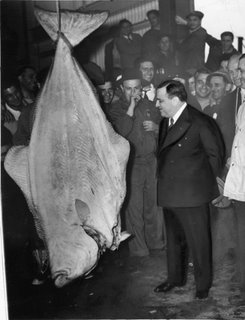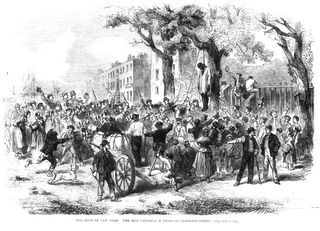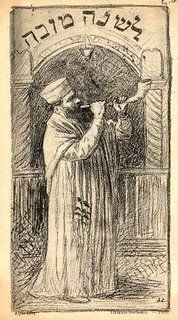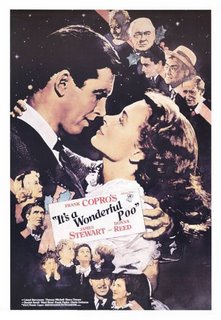
Tuesday, October 31, 2006
The Daily Hump: The Bogeyman
Happy Halloween. I thought I'd start things off with a Cornish prayer:
 Wikipedia lays out a few alternate theories of the Bogeyman's etymology including:
Wikipedia lays out a few alternate theories of the Bogeyman's etymology including:
Stay tuned for later in the week when I hump hobgoblins, jack-o'-lanterns and bugaboos.
From ghoulies and ghosties and long-leggety beastiesThe Cornish language, today only spoken by about 3,500 people, is of the Brythonic group of Celtic languages along with Welsh and Breton. It is generally believed that from this group we find the etymology of our modern day bogeyman. Specifically, bogey may be a cognate of the Welsh bwgwl, meaning "terror, terrifying". As Michael Quinion observes
And things that go bump in the night, Good Lord, deliver us!
The Welsh root word bwg gave rise to the long-obsolete word bug for a hobgoblin, which now survives only in bugbear, a dreadful bearlike apparition that ate naughty children, a more terrifying idea than the modern weakened sense of something merely vexatious or annoying. Another closely related word is bugaboo. Possibly also related is the barghest, a goblin which appeared in the form of a large, black dog and which portended doom...This obsolete form, bug, is related to the Middle English bugge, a frightening specter, which is ultimately the source of the modern bogey, also sometimes spelled bogy. Bogey is a quasi-proper name that often refers to the devil. The OED noted that in an 1887 survey older people remembered hearing the word in this form as far back as 1825 although written evidence only goes back as far as 1836-1840.
 Wikipedia lays out a few alternate theories of the Bogeyman's etymology including:
Wikipedia lays out a few alternate theories of the Bogeyman's etymology including:...a reference to Napoleon Bonaparte, who was nicknamed "Boney" by the British. Boney was certainly used as a threat to British children of the time, and it is claimed that Boney became Boneyman, which became Bogeyman.In addition to haunting the bedrooms of children, the bogeyman made his presence known on many a golf course where bogey originally meant "the number of strokes a good player may be reckoned to need for the course or for a hole" (since the 1940s bogey has meant a score of one stroke over par for a hole). The OED quotes the following annecdote:
It may also have been derived from the Bugis people of Indonesia, feared pirates who preyed on shipping in the Straits of Malacca. According to this latter theory, European sailors who encountered them took their tales back to the Old World, telling stories of the "bugismen" to scare their children into behaving.
Still other sources trace the etymology through "boggy man" back to the bog men found from time to time preserved out in the peat bogs. According to this story, the fear was that the bog men would come walking off the moors like zombies.
One popular song at least has left its permanent effect on the game of golf. That song is ‘The Bogey Man’. In 1890 Dr. Thos. Browne, R.N., the hon. secretary of the Great Yarmouth Club, was playing against a Major Wellman, the match being against the ‘ground score’, which was the name given to the scratch value of each hole. The system of playing against the ‘ground score’ was new to Major Wellman, and he exclaimed, thinking of the song of the moment, that his mysterious and well-nigh invincible opponent was a regular ‘bogey-man’. The name ‘caught on’ at Great Yarmouth, and to-day ‘Bogey’ is one of the most feared opponents on all the courses that acknowledge him (1908 M.A.P. 25 July 78/1).And in case you were curious (I was) boogies (also known as boogers, rhinolith or dried snot) first appeared in American slang dictionaries in the 1890s, suggesting its use in common parlance much much earlier. Alas, whether they have anything to do with the bogeyman is anyone's guess.
Stay tuned for later in the week when I hump hobgoblins, jack-o'-lanterns and bugaboos.
Labels: Breton, Cornish, Middle English, The Daily Hump, Welsh Gaelic
Monday, October 30, 2006
The Daily Hump: Berserker
No, Berserker is not just the title track off the great 1984 Gary Numan album. The word also refers to a band of Norse warriors who worked themselves into a frenzy before getting early medieval on whomever had the misfortune of crossing paths with them. Unlike their Viking namesakes, today you don't need to rape or pillage the local populace to be "going berserk"; no, the standard is much much lower--you just need to be mentally or emotionally upset. Thus, the word, which entered our language in the early 19th c., has lost a lot of its oomph, imho.
 But enough lamenting--berserker is from the Old Norse berserkr which the AHD defines as a "wild warrior or champion". The word likely comes from the compound bear-sark, sark being a fairly archaic word meaning "shirt" (side note: per the OED, sark still means "shirt" in modern Scandinavian languages). This descriptive name refers to the bear hides that the warriors would wear as they marauded around the North Atlantic from the 9th through 11th centuries.
But enough lamenting--berserker is from the Old Norse berserkr which the AHD defines as a "wild warrior or champion". The word likely comes from the compound bear-sark, sark being a fairly archaic word meaning "shirt" (side note: per the OED, sark still means "shirt" in modern Scandinavian languages). This descriptive name refers to the bear hides that the warriors would wear as they marauded around the North Atlantic from the 9th through 11th centuries.
Most of what we know about berserkers comes from the sagas, specifically Egils saga, most likely written in the 13th c by Snorri Sturluson. I've been to Borg, home of Egils saga's protagonist, Egills Skallagrímsson, but alas, found no berserkers.
See also apeshit.
 But enough lamenting--berserker is from the Old Norse berserkr which the AHD defines as a "wild warrior or champion". The word likely comes from the compound bear-sark, sark being a fairly archaic word meaning "shirt" (side note: per the OED, sark still means "shirt" in modern Scandinavian languages). This descriptive name refers to the bear hides that the warriors would wear as they marauded around the North Atlantic from the 9th through 11th centuries.
But enough lamenting--berserker is from the Old Norse berserkr which the AHD defines as a "wild warrior or champion". The word likely comes from the compound bear-sark, sark being a fairly archaic word meaning "shirt" (side note: per the OED, sark still means "shirt" in modern Scandinavian languages). This descriptive name refers to the bear hides that the warriors would wear as they marauded around the North Atlantic from the 9th through 11th centuries.Most of what we know about berserkers comes from the sagas, specifically Egils saga, most likely written in the 13th c by Snorri Sturluson. I've been to Borg, home of Egils saga's protagonist, Egills Skallagrímsson, but alas, found no berserkers.
See also apeshit.
Labels: Old Norse, The Daily Hump
Friday, October 27, 2006
TRJ: Smorgasbord
Totat Request Jive, or TRJ for short, is a weekly Friday feature where you the WordHumper reader decide which lucky word gets humped back to the stoneage (or at least to Proto-Indo-Europa). Today's word comes from CH (again, c'mon people--we need more entries) in Brooklyn who writes: An excellent choice, Caroline...er...CH from Brooklyn. Smorgasbord, smörgåsbord in Swedish (I wish English would leave in umlaut and ring diacritics. They make words much more interesting to look at.), describes a sort of buffet; or, more generically, a varied collection of anything. Smörgås on its own is a slice of bread with butter. The word smör comes to us from Old Norse and means butter; it's a cognate of our English noun smear. Gås is a Swedish dialectal word meaning "lump of butter" and if from the Old Norse gās, goose. Gās gave English its word for a young goose, gosling. Bord, also from Old Norse, is a table and is a cognate of our word board. Der.
An excellent choice, Caroline...er...CH from Brooklyn. Smorgasbord, smörgåsbord in Swedish (I wish English would leave in umlaut and ring diacritics. They make words much more interesting to look at.), describes a sort of buffet; or, more generically, a varied collection of anything. Smörgås on its own is a slice of bread with butter. The word smör comes to us from Old Norse and means butter; it's a cognate of our English noun smear. Gås is a Swedish dialectal word meaning "lump of butter" and if from the Old Norse gās, goose. Gās gave English its word for a young goose, gosling. Bord, also from Old Norse, is a table and is a cognate of our word board. Der.
Okay, I know your next question--why do the Swedes use the same word for goose and lump of butter? I did some research and found a few theories, all listed on the American Dialectal Society mailing list, circa July 2001.
If you have a word you'd like humped because you're either too lazy or inept to do it yourself please email it, along with your location, to wordhumper. And in case you missed the TRJ from two weeks ago check out Hallucinations. See you Monday!
I have a TRJ for you, "smorgasboard"...saw it on the Weather Channel this morning and I thought I'd mention it.
 An excellent choice, Caroline...er...CH from Brooklyn. Smorgasbord, smörgåsbord in Swedish (I wish English would leave in umlaut and ring diacritics. They make words much more interesting to look at.), describes a sort of buffet; or, more generically, a varied collection of anything. Smörgås on its own is a slice of bread with butter. The word smör comes to us from Old Norse and means butter; it's a cognate of our English noun smear. Gås is a Swedish dialectal word meaning "lump of butter" and if from the Old Norse gās, goose. Gās gave English its word for a young goose, gosling. Bord, also from Old Norse, is a table and is a cognate of our word board. Der.
An excellent choice, Caroline...er...CH from Brooklyn. Smorgasbord, smörgåsbord in Swedish (I wish English would leave in umlaut and ring diacritics. They make words much more interesting to look at.), describes a sort of buffet; or, more generically, a varied collection of anything. Smörgås on its own is a slice of bread with butter. The word smör comes to us from Old Norse and means butter; it's a cognate of our English noun smear. Gås is a Swedish dialectal word meaning "lump of butter" and if from the Old Norse gās, goose. Gās gave English its word for a young goose, gosling. Bord, also from Old Norse, is a table and is a cognate of our word board. Der.Okay, I know your next question--why do the Swedes use the same word for goose and lump of butter? I did some research and found a few theories, all listed on the American Dialectal Society mailing list, circa July 2001.
...the etymology of the word is not 100% certain,or
but apparently it was first used to describe the butter clumps that (as geese) float on the butter milk when one churns butter.
The origin of gås is indeed goose, but smörgås is to be interpreted as goose fat used as a spread ("smear") for bread. Today, of course, the spread is likely not to be goose fat but dairy-based...or
I was always under the impression that the word smörgås was meant to mean "butter goose," in which the open-faced sandwich looks like a goose because the toppings are piled so high. So I'm speculating that it has less to do with goose fat than with a goose shape.The goose-fat theory seems the most credible to me; afterall the Swedes eat some nasty stuff. Seriously, have you ever been to a country that has as many foods available in tube-form? Gross.
If you have a word you'd like humped because you're either too lazy or inept to do it yourself please email it, along with your location, to wordhumper. And in case you missed the TRJ from two weeks ago check out Hallucinations. See you Monday!
Thursday, October 26, 2006
The Daily Hump: Genitive Herpes
I know, I know...I said I'd do a post yesterday and I didn't. AdSense has made me a total of $1.07 since I launched this site so let's just say there are some other more lucrative priorities.
 Now that that's out of the way, today I thought we'd do something a bit different and not hump a word but rather the morpheme 's. Have you ever sat around and wondered why we use a 's to denote possession? You probably haven't, but that's where you and I differ. I've studied a few other languages including Latin, Old Norse and French and none of these use a 's. As far as my admittedly limited knowledge demonstrates, the 's is a purely English phenomenon and I'm determined to figure out why (or at least where it came from).
Now that that's out of the way, today I thought we'd do something a bit different and not hump a word but rather the morpheme 's. Have you ever sat around and wondered why we use a 's to denote possession? You probably haven't, but that's where you and I differ. I've studied a few other languages including Latin, Old Norse and French and none of these use a 's. As far as my admittedly limited knowledge demonstrates, the 's is a purely English phenomenon and I'm determined to figure out why (or at least where it came from).
If you've studied Latin, or most other languages where meaning is not dependent on word order, you've probably studied cases, and more specifically the genitive case. In simplistic terms the genitive case is the series of manipulations you make to a word to show that it possesses something. For instance, puella in Latin means "the girl", yet puellae servus would mean "the girl's slave". This -ae ending is the genitive suffix (feminine singular in this instance). As you see in this example the genitive -ae directly translates to our modern English 's. Thus, one could argue that the 's is the English genitive ending. One could argue this, but one would be considered wrong.
Sure, once upon a time you'd be considered correct. Back then linguists called the 's a saxon genitive. This name harkens back to English's Germanic roots; however, the more savvy modern linguist has come to realize that the 's is not representative of a genitive case at all, but rather it has become a (prepare to giggle) clitic. Think of a clitic as the remora of linguistics, a functional parasitic word that cannot live on its own and must be combined with a host. A good example would be the l' in the French l'eau (the water). Anyway, here's a classic example of why the 's is considered clitic and not representative of a genitive case: "The king of Sparta's wife was called Helen." If 's was a genetive ending then Helen would be the wife of Sparta, however, obviously Helen is the wife of the king, thus the 's is not showing possession directly, but is instead functioning a bit more abstractly.
Regardless of our modern constructions of possession, the 's started off as a genitive ending. In Old English the genitive ending was -es, so the apostrophe in our 's once upon a time substituted for the missing e, much like how apostrophes signify missing letters in everyday contractions such as didn't and we'll (but not gn'fn'r because I can't figure our what letters the apostrophes are substituting).
Why the apostrophe came into use when showing possession is up for debate. In Christina Cavella and Robin A. Kernodle's paper How the Past Affects the Future: The Story of the Apostrophe, they point out that some experts believe the apostrophe
Genitive Case [Wikipedia]
 Now that that's out of the way, today I thought we'd do something a bit different and not hump a word but rather the morpheme 's. Have you ever sat around and wondered why we use a 's to denote possession? You probably haven't, but that's where you and I differ. I've studied a few other languages including Latin, Old Norse and French and none of these use a 's. As far as my admittedly limited knowledge demonstrates, the 's is a purely English phenomenon and I'm determined to figure out why (or at least where it came from).
Now that that's out of the way, today I thought we'd do something a bit different and not hump a word but rather the morpheme 's. Have you ever sat around and wondered why we use a 's to denote possession? You probably haven't, but that's where you and I differ. I've studied a few other languages including Latin, Old Norse and French and none of these use a 's. As far as my admittedly limited knowledge demonstrates, the 's is a purely English phenomenon and I'm determined to figure out why (or at least where it came from).If you've studied Latin, or most other languages where meaning is not dependent on word order, you've probably studied cases, and more specifically the genitive case. In simplistic terms the genitive case is the series of manipulations you make to a word to show that it possesses something. For instance, puella in Latin means "the girl", yet puellae servus would mean "the girl's slave". This -ae ending is the genitive suffix (feminine singular in this instance). As you see in this example the genitive -ae directly translates to our modern English 's. Thus, one could argue that the 's is the English genitive ending. One could argue this, but one would be considered wrong.
Sure, once upon a time you'd be considered correct. Back then linguists called the 's a saxon genitive. This name harkens back to English's Germanic roots; however, the more savvy modern linguist has come to realize that the 's is not representative of a genitive case at all, but rather it has become a (prepare to giggle) clitic. Think of a clitic as the remora of linguistics, a functional parasitic word that cannot live on its own and must be combined with a host. A good example would be the l' in the French l'eau (the water). Anyway, here's a classic example of why the 's is considered clitic and not representative of a genitive case: "The king of Sparta's wife was called Helen." If 's was a genetive ending then Helen would be the wife of Sparta, however, obviously Helen is the wife of the king, thus the 's is not showing possession directly, but is instead functioning a bit more abstractly.
Regardless of our modern constructions of possession, the 's started off as a genitive ending. In Old English the genitive ending was -es, so the apostrophe in our 's once upon a time substituted for the missing e, much like how apostrophes signify missing letters in everyday contractions such as didn't and we'll (but not gn'fn'r because I can't figure our what letters the apostrophes are substituting).
Why the apostrophe came into use when showing possession is up for debate. In Christina Cavella and Robin A. Kernodle's paper How the Past Affects the Future: The Story of the Apostrophe, they point out that some experts believe the apostrophe
is "a mere printer’s gimmick, doubtless born of the mistaken notion that the genitive ending was a contraction of his". An invention of mortals, the apostrophe has indeed been subject to human error. The –es genitive ending,Despite all this, in Modern English remnants of the genitive case live on in some of our pronouns: whose, my/mine, his/hers/its, our/ours, their/theirs.often spelled and pronounced –ies or –ys in early Middle English, was confused as early as the thirteenth century with his, the possessive of he, so that Shakespeare could later write ‘the count his gally’, and even expressions like ‘my sister her watch’ appeared (qtd. in Hook, 1999, pp. 44-45).The unstressed pronunciation of the genitive –es seemed to have caused many speakers to believe they were saying his. This usage presumably caused pronunciation problems and gender confusion with a noun such as woman or girl, or a plural noun like winners, but nevertheless was quite common (Hook, 1975, p.160). The apostrophe became a sort of "compromise" to indicate either the missing –e in the genitive ending –es, or the hi of the mistaken possessive indicator his (Hook, 1999, p. 45).
Genitive Case [Wikipedia]
Labels: Latin, Middle English, Old English, The Daily Hump
Friday, October 20, 2006
The Googlization of YouTube
 Okay, apparently there's some unwritten rule in the blogosphere (God, I hate that word) that says you have to publish at least one post about GoogTube. I'm not going to comment on the merger, I think everything that needs to be said has already been published. And even if it hasn't I don't really have any insight to offer. Instead, I will refer you to this WSJ.com piece where Leo Gomes observes that YouTube is quickly joining the ranks of Google and TiVo as one of those few companies whose name has become a verb--and, in the case of YouTube, even an adjective.
Okay, apparently there's some unwritten rule in the blogosphere (God, I hate that word) that says you have to publish at least one post about GoogTube. I'm not going to comment on the merger, I think everything that needs to be said has already been published. And even if it hasn't I don't really have any insight to offer. Instead, I will refer you to this WSJ.com piece where Leo Gomes observes that YouTube is quickly joining the ranks of Google and TiVo as one of those few companies whose name has become a verb--and, in the case of YouTube, even an adjective.
The Daily Hump: Mushrooms and Toadstools
 There's so much to say about mushrooms and toadstools from a historical and cultural perspective that I wouldn't know where to begin nor is WordHumper the forum to explore the intricacies of my favorite fungi. The best I can do is suggest you read Elio Schaecter's excellent In The Company of Mushrooms*. As for me, I'll be limiting this discourse to purely an etymological examination.
There's so much to say about mushrooms and toadstools from a historical and cultural perspective that I wouldn't know where to begin nor is WordHumper the forum to explore the intricacies of my favorite fungi. The best I can do is suggest you read Elio Schaecter's excellent In The Company of Mushrooms*. As for me, I'll be limiting this discourse to purely an etymological examination.Mushroom comes to us from the Medieval Latin musariō, musariōn- via Old French, Anglo-Norman then finally Middle English. Per the Online Etymology Dictionary:
Barnhart says [mushroom is] "of uncertain origin." Klein calls it "a word of pre-Latin origin, used in the North of France;" OED says it usually is held to be a derivative of Fr. mousse "moss," and Weekley agrees, saying it is properly "applied to variety which grows in moss."Don't worry, I don't know who Banhart, Klein or Weekley are either.
Toadstool is one of my favorite words in the English language. The OED and many other dictionaries explain the word as "fanciful"; a compound of toad + stool that was first coined in Middle English. Toads were regarded as extremely poisonous and toadstools generally only refer to inedible or poisonous mushrooms. In my readings I also happened upon an alternate etmology which suggests that toadstool had nothing to do with toads but rather the German tod, death. As Wikipedia states:

The term [toadstool] dates from the fourteenth century and is a fanciful [there is that word again!] name combining toad, which were associated with poison, and stool, which is an archaic term for the head of a mushroom. Another explanation comes from the German translation of tod-stuhl, literally, "death-chair," referring to the shape of the fruiting body and also to the slow, agonizing death from mushroom poisoning for those who eat it.Regardless of which etymology is correct, toadstools are named for their toxicity. Given the association of toads with poison I investigated whether the English toad could be related to the German tod; alas, the OED claims that although toad can be traced as far back as to the Old English tādige it has no cognates in other languages and is thus considered of unknown origin.**
In conclusion, next time you're shrooming with the hippies, smelling a stinky phallus, hanging out with the hobbits, Smurfs, mycologists, or Brothers Mario, or just eating a slice of pizza stop and think about what a lousy and boring world we'd live in without the ubiquitous mushroom.***
*Completely unrelated, I also suggest you read Spy: The Funny Years.
 **It should be noted that Princess Toadstool is the best character available in Super Mario Bros 2 (photo: SMB1). Obviously, I'm not the only person who wondered why Mario would be romantically involved with someone whose last name is based upon a fungus responsible for "slow, agonizing death"; in late 1996 Nintendo changed her name to Peach. So gay.
**It should be noted that Princess Toadstool is the best character available in Super Mario Bros 2 (photo: SMB1). Obviously, I'm not the only person who wondered why Mario would be romantically involved with someone whose last name is based upon a fungus responsible for "slow, agonizing death"; in late 1996 Nintendo changed her name to Peach. So gay.***I'll be out of the country for a few days so the next hump will be on Wednesday.
Labels: Anglo-Norman, German, Medieval Latin, Middle English, Old English, Old French, The Daily Hump
Thursday, October 19, 2006
The Daily Hump: Akimbo
 Akimbo surprises me. Given its -bo ending I ignorantly assumed it had African roots (think Mande languages of the upper Niger River valley or our English word mumbo jumbo). In fact, the word can be traced back to Middle English, first appearing in the early 15th c. text The Tale of Beryn ("The hoost..set his hond in kenebowe"). We know in is our modern in. The -bowe corresponds to our modern English bow, as in something that is bent, a knot with two loops or the weapon used to launch arrows. It's the kene portion which stumps the experts. Because of this single element historical linguists have a great deal of difficulty tracing the word's etymology pre-1400.
Akimbo surprises me. Given its -bo ending I ignorantly assumed it had African roots (think Mande languages of the upper Niger River valley or our English word mumbo jumbo). In fact, the word can be traced back to Middle English, first appearing in the early 15th c. text The Tale of Beryn ("The hoost..set his hond in kenebowe"). We know in is our modern in. The -bowe corresponds to our modern English bow, as in something that is bent, a knot with two loops or the weapon used to launch arrows. It's the kene portion which stumps the experts. Because of this single element historical linguists have a great deal of difficulty tracing the word's etymology pre-1400.The OED is kind enough to suggest two possibilities. The first theory focuses around the Middle English phrase a cambok which meant "in the manner of a crooked stick". Thus, analagously, a cam bow would be "in the manner of a crooked bow". The second theory suggests that akimbo is related to the Old Norse keng-boginn which literally means "bent staple-wise, or in a horse-shoe curve". The OED deems neither of these theories wholly satisfactory:
The difficulty as to a-cambok, a cam bow, is that no forms of the word [akimbo] show cam-, from which the earliest are the most remote. The Icel. keng-boginn comes nearer the form, but there is no evidence that it had the special sense of a-kimbo, and none that the latter ever had the general sense of ‘crooked.’ It also postulates an early Eng. series of forms like *keng-bown or *keng-bowed, *keng-bow, *akengbow, quite unknown and unaccounted for.
Labels: Mande, Middle English, Old Norse, The Daily Hump
Wednesday, October 18, 2006
The Daily Hump: Choppin' Broccoli
 Broccoli has been a favorite vegetable of mine for years now. Whether steamed, raw or stir-fried it's one of the simple pleasures in life. My love stems from a number of factors including broccoli's taste, the auditory satisfaction I receive when crunching into a raw floret, and even broccoli's general aesthetic qualities--the deep green and bonzai-like complexity.
Broccoli has been a favorite vegetable of mine for years now. Whether steamed, raw or stir-fried it's one of the simple pleasures in life. My love stems from a number of factors including broccoli's taste, the auditory satisfaction I receive when crunching into a raw floret, and even broccoli's general aesthetic qualities--the deep green and bonzai-like complexity.Despite its obvious Italian roots, the first mention of broccoli is in a mid-16th c. French text. It's possible Romans were cultivating the plant as far back as the 1st c. CE (a vegetable similar to broccoli is described by Pliny the Elder) but, at least in the New World, the vegetable was considered fairly exotic until commercial cultivation began in California in 1922.
In Italian the word broccoli is a plural form of broccolo, which is the flowering sprout of a turnip. The root brocco means shoot or stalk and is a direct descendant of the vulgar Latin *brocca meaning spike. In addition to broccoli, *brocca gives us such modern English words as broach (via the Latin broccus, projecting), brooch and brocade.
broccoli [OED]
broccoli [Wikipedia]
Labels: French, Italian, Latin, The Daily Hump
Tuesday, October 17, 2006
The Daily Hump: Plagiary
Following on the heels of yesterday's post I decided that today we'd hump plagiary. The word is from the Latin plagiārius meaning the person who abducts the child or slave of another, a kidnapper. In civil law one can be tried for the crime of plagium, which is the crime of kidnapping, especially in reference to children. It's likely that plagium and plagiarism are also related to the Latin plaga meaning a net, snare or a spider's web. Plaga made it into English as the obscure plage, also meaning net or snare.
The OED suggests that plage as defined above may also be connected to the sense of plage meaning, either obscurely, a district or region in general or, in mordern astronomy, an unusually bright area of the sun's chromosphere. Plage in this sense is not related to the French plage, meaning beach, but rather a more archaic Latin definition of the word meaning "region". It's believed that this form shares an Indo-European root with the Old High German word flah (flat) which is potentially the source for our modern English noun flake, as in snowflake.
The OED suggests that plage as defined above may also be connected to the sense of plage meaning, either obscurely, a district or region in general or, in mordern astronomy, an unusually bright area of the sun's chromosphere. Plage in this sense is not related to the French plage, meaning beach, but rather a more archaic Latin definition of the word meaning "region". It's believed that this form shares an Indo-European root with the Old High German word flah (flat) which is potentially the source for our modern English noun flake, as in snowflake.
Labels: Latin, Old High German, The Daily Hump
Monday, October 16, 2006
M-W's Word of the Day: Plagiarism
Well, it's not, but maybe it should be. Just one short week after WordHumper humped antonomasia it looks like M-W has jumped on the WH bandhumpwagon.
It's okay--I'm flattered.
It's okay--I'm flattered.
TRJ: Hallucinations
Totat Request Jive, or TRJ for short, is a weekly Friday feature where you the WordHumper reader decide which lucky word gets humped back to the stoneage (or at least to Proto-Indo-Europa). Alas, my roof was in danger of caving in this past Friday, so last week's TRJ was postponed until this morning. Today's word comes from RM in Walnut Creek who asks where the word hallucinate comes from.
Hallucinate is from a Latin root, hallūcinārī, hallūcināt- which means to dream or to be deceived. This verb, in turn, is a variant of ālūcinārī, meaning "to wander in the mind, talk idly, prate". The Online Etymology Dictionary adds: At least one person, Leo Rutherford, has the misconception that "'hallucinogenic' comes from the word 'hallowed'" and used this false etymology to bolster his justification for the use of hallucinogenic drugs in religious ritual. Mark Liberman at the Language Log did a nice job debunking this idea noting that the words do not share a common root, however halibut and hallow do (both are from the Indo-European root kailo meaning "whole, uninjured, of good omen"). Thus by Rutherford's logic he is
At least one person, Leo Rutherford, has the misconception that "'hallucinogenic' comes from the word 'hallowed'" and used this false etymology to bolster his justification for the use of hallucinogenic drugs in religious ritual. Mark Liberman at the Language Log did a nice job debunking this idea noting that the words do not share a common root, however halibut and hallow do (both are from the Indo-European root kailo meaning "whole, uninjured, of good omen"). Thus by Rutherford's logic he is
If you have a word you'd like humped because you're either too lazy or inept to do it yourself please email it, along with your location, to wordhumper. And in case you missed last week's TRJ check out Antonomasia.
hallucinate [OED]
Hallucinate is from a Latin root, hallūcinārī, hallūcināt- which means to dream or to be deceived. This verb, in turn, is a variant of ālūcinārī, meaning "to wander in the mind, talk idly, prate". The Online Etymology Dictionary adds:
...probably from Gk. alyein, Attic halyein "be distraught," probably related to alasthai "wander about." The L. ending probably was influenced by vaticinari "to prophecy," also "to rave." Sense of "to have illusions" is from 1652. Hallucination in the pathological/psychological sense of "seeing or hearing something which is not there" is first recorded 1646; distinct from illusion in not necessarily involving a false belief. Hallucinogen "drug which induces hallucinations" is first recorded 1954; hallucinogenic (adj.) in this sense is from 1952.
 At least one person, Leo Rutherford, has the misconception that "'hallucinogenic' comes from the word 'hallowed'" and used this false etymology to bolster his justification for the use of hallucinogenic drugs in religious ritual. Mark Liberman at the Language Log did a nice job debunking this idea noting that the words do not share a common root, however halibut and hallow do (both are from the Indo-European root kailo meaning "whole, uninjured, of good omen"). Thus by Rutherford's logic he is
At least one person, Leo Rutherford, has the misconception that "'hallucinogenic' comes from the word 'hallowed'" and used this false etymology to bolster his justification for the use of hallucinogenic drugs in religious ritual. Mark Liberman at the Language Log did a nice job debunking this idea noting that the words do not share a common root, however halibut and hallow do (both are from the Indo-European root kailo meaning "whole, uninjured, of good omen"). Thus by Rutherford's logic he is ...correct in supporting the use of halibut in religious rituals, but for magic mushrooms he'll have to look to other arguments.As for the photo on the right, you're not hallucinating; that's Fiorello LaGuardia inspecting a 300-pound halibut.
If you have a word you'd like humped because you're either too lazy or inept to do it yourself please email it, along with your location, to wordhumper. And in case you missed last week's TRJ check out Antonomasia.
hallucinate [OED]
Friday, October 13, 2006
TRJ: Psych!
I'm sorry to say that Total Request Jive has been postponed until Monday because my house is full of Bosnians of this morning's much-needed home repairs. Thank you for your patience in these trying times.
UPDATE: I believe it'd be trite to hump either triskaidekaphobia or paraskavedekatriaphobia so I'm not.
UPDATE: I believe it'd be trite to hump either triskaidekaphobia or paraskavedekatriaphobia so I'm not.
Thursday, October 12, 2006
The Daily Hump: Donnybrook
 Sure, the photo looks peaceful enough. But this Dublin suburb was once the source of an annual
Sure, the photo looks peaceful enough. But this Dublin suburb was once the source of an annual As Michael Quinion reports:
A passing reference in, of all sober works, Walter Bagehot’s The English Constitution of 1867, gives a flavour: "The only principle recognised...was akin to that recommended to the traditionary Irishman on his visit to Donnybrook Fair, ‘Wherever you see a head, hit it’." The usual weapon was a stick of oak or blackthorn that Irishmen often called a shillelagh (a word which derives from the town of that name in County Wicklow). The legend was that visitors to Donnybrook fair would rather fight than eat.
 Thankfully, only 8 short years after the fair was shut down, the Irish found a new outlet for their playful aggressiveness--the New York City Draft Riots.
Thankfully, only 8 short years after the fair was shut down, the Irish found a new outlet for their playful aggressiveness--the New York City Draft Riots. The great irony in all of this is that today Donnybrook is one of Dublin's most affluent suburbs.
Labels: The Daily Hump
Wednesday, October 11, 2006
The Daily Hump: Lackadaisical
WordHumper would like to extend warm wishes to once-frequent, now lackadaisical, contributor Caroline who celebrates her 30th birthday today. You may remember Caroline from classic WordHumper posts such as:
Penultimate Frisbee
The Hardworking Do-rag
Hump This: Heckle
Caroline has unexplicably decided to abandon wasting time on etymological musings and instead nurture her real career over at The Longstockings. Regardless, Happy Birthday.
Now back to business: lackadaisical. You may remember this word from when I used it in the first paragraph. It describes someone lacking spirit, languid, sans liveliness.
 Michael Quinion, who basically created the concept of WordHumper years before I got around to it (but instead called it World Wide Words), humped lackadaisical back in June 2001:
Michael Quinion, who basically created the concept of WordHumper years before I got around to it (but instead called it World Wide Words), humped lackadaisical back in June 2001:
Penultimate Frisbee
The Hardworking Do-rag
Hump This: Heckle
Caroline has unexplicably decided to abandon wasting time on etymological musings and instead nurture her real career over at The Longstockings. Regardless, Happy Birthday.
Now back to business: lackadaisical. You may remember this word from when I used it in the first paragraph. It describes someone lacking spirit, languid, sans liveliness.
 Michael Quinion, who basically created the concept of WordHumper years before I got around to it (but instead called it World Wide Words), humped lackadaisical back in June 2001:
Michael Quinion, who basically created the concept of WordHumper years before I got around to it (but instead called it World Wide Words), humped lackadaisical back in June 2001: It [Lackadaisical] owes its origin, strangely enough, to an old saying of regret or dismay, lack-a-day!, a shortened form of alack-a-day!. Alack dates back to medieval times, and probably comes from a dialect word lack that is variously interpreted as failure, fault, reproach, disgrace, or shame. So alack-a-day! originally meant "Shame or reproach to the day!" (that it should have brought this upon me). But over time it became weakened until it became no more than a vapid and vacuous cry when some minor matter went awry.The Bard peppered a few of his works with alack-a-day, notably The Tragedie of King Lear ("Alacke, alacke the day") and Romeo & Juliet where the expression creates a parallel between the Nurse's reaction to Romeo's apparent death and Juliet's authentic expiration:
Nurse: A weladay, hee's dead, hee's dead, We are vndone Lady, we are vndone. Alacke the day, hee's gone, hee's kil'd, he's deadand
Nurse: Shee's dead: deceast, shee's dead: alacke the dayOn a side note, I intended to hump the word hickey today, but alack-a-day, its origin is unknown.
Labels: Shakespeare, The Daily Hump
Tuesday, October 10, 2006
The Daily Hump: I've got wood...
 ...wainscotting, that is. For those of you who aren't involved in home decorating wainscotting is either the panel (usually wood) that's applied to walls of rooms or it's the lower part of a wall when its finish is different than the upper portion. Although now mainly decorative, its original purpose was to cover the lower part of walls which were often subjected to rising dampness. In more general terms wainscot is a high quality type of oak imported from either Russia, Germany or the Netherlands.
...wainscotting, that is. For those of you who aren't involved in home decorating wainscotting is either the panel (usually wood) that's applied to walls of rooms or it's the lower part of a wall when its finish is different than the upper portion. Although now mainly decorative, its original purpose was to cover the lower part of walls which were often subjected to rising dampness. In more general terms wainscot is a high quality type of oak imported from either Russia, Germany or the Netherlands. Marge Simpson: This house has such beautiful wainscotting.Marge is right. Per the American Heritage Dictionary wainscot is a Middle English word from the Middle Dutch waghenscot. It's likely that waghen- is related to the Dutch wagen or our word wagon as wainscot may have referred to the quality of wood used in carriage construction. The suffix -scot simply means "partition".
Mrs. Quimby: Marge, I didn't know you were into wainscotting.
Marge: I read an article about it at the tire store. Did you know it's not named after someone named Wayne Scott?
Woah...hold your horses there, American Heritage. The OED isn't too quick to define -scot as partition. In fact, it doesn't at all--simply saying the ending has an "uncertain meaning". Even the the waghen- portion is up for debate with a 16th century source saying the word is from the Flemish waeghe, wave, referring to the undulations in the grain of the wood. Some modern scholars suspect the prefix comes from the Middle Dutch weeg, wall. The OED stands by its contention that wain- really is from wagon- although it admits the original meaning of the compound word is a mystery.
It's interesting to note that there is a word wain that appears in Middle English and up through dialectal Modern English meaning a large open vehicle, such as a wagon. Both wain and wagon can be traced back to the Indogermanic root *wegh- or *wogh- meaning "to carry". This root also gives us modern words of common usage such as weigh and way.
For you Hamptons folks, you've likely blinked and missed the hamlet of Wainscott (note: two t's--population 628) while heading out to your Amagansett house. In researching the etymology I uncovered this from Newsday.com:
Four years after East Hampton Town was founded in 1648, the first mention of the rich soil of Wainscott occurs in official records, citing an order that "a cartway shall be laid out to Wainscott where it may be most convenient.''
 Wainscott post office: note lack of wainscotting
Wainscott post office: note lack of wainscottingGiven the OED's definition of wain is it possible that Wainscott received its name because of this "cartway"? That'd be cool, but no. Per Wikipedia the hamlet was named after a village north of Maidstone, England.
Labels: Middle Dutch, Middle English, PIE, The Daily Hump
Monday, October 09, 2006
The Daily Hump: Kudos

Happy Columbus Day/Indigenous Peoples Day/Día de la Raza.
I'll be honest, sleep did not come easily last night. I've been battling what I think are allergies, maybe it's a cold or perhaps it's just your run-of-the-mill fear of Asian nuclear proliferation, I'm not sure. What I do know is that unlike a substantial percentage of the American workforce I have to work today; as a protest you're receiving an abbreviated hump, chockablockquote:
KudosKudos [American Heritage Dictionary]
Acclaim or praise for exceptional achievement.
[Greek kūdos, magical glory.]USAGE NOTE Kudos is one of those words like congeries that look like plurals but are etymologically singular. Acknowledging the Greek history of the term requires Kudos is (not are) due her for her brilliant work on the score. But kudos has often been treated as a plural, especially in the popular press, as in She received many kudos for her work. This plural use has given rise to the singular form kudo. These innovations follow the pattern whereby the English words pea and cherry were shortened from nouns ending in an (s) sound (English pease and French cerise), that were mistakenly thought to be plural. The singular kudo remains far less common than the plural use; both are often viewed as incorrect in more formal contexts. • It is worth noting that even people who are careful to treat kudos only as a singular often pronounce it as if it were a plural. Etymology would require that the final consonant be pronounced as a voiceless (s), as we do in pathos, another word derived from Greek, rather than as a voiced (z).
Labels: Greek, The Daily Hump
Friday, October 06, 2006
TRJ: Antonomasia
Totat Request Jive, or TRJ fo' short, is a weekly Friday feature where you the WordHumper reader decide which lucky word gets humped back to the stoneage (or at least to Proto-Indo-Europa). Today's word comes from JG in Manhattan who writes:
Antonomasia comes from a Greek word, antonomazein (not to be confused with Abu Mazen), meaning "to name differently". JG, I don't want to belittle your initial hump attempt with patronizing hooey because you did a really really swell job even though you were laughably off the mark--I'm sure you'll do just great next time. I say it time and time again: It's best to leave the serious humping to the professional humpers (which would be me): case in point, the anto- is actually the *same* as anti-, in this case taking on the sense of "instead of", while onomazein comes from the Greek onoma, meaning "name" (okay, I take back my patronizing hooey, you got the nom right). And although you're free to masticate while humping (and sometimes after humping), antonomasia itself has nothing to do with chewing (you did mean chewing, right?).
Per Wikipedia:

THE WORD IS 'ANTONOMASIA'. so you've got anto, which might mean 'same' since it' not 'anti' and 'nom' wich is obviously 'name and 'masia' feels like 'masticating' so that means 'said'? or 'feel in mouth'?'same name said'? 'same name feel in mouth'? woah i'm tired. have fun humping....!JG, I *always* have fun humping, especially things I've never heard of. Let's hump to it--
Antonomasia comes from a Greek word, antonomazein (not to be confused with Abu Mazen), meaning "to name differently". JG, I don't want to belittle your initial hump attempt with patronizing hooey because you did a really really swell job even though you were laughably off the mark--I'm sure you'll do just great next time. I say it time and time again: It's best to leave the serious humping to the professional humpers (which would be me): case in point, the anto- is actually the *same* as anti-, in this case taking on the sense of "instead of", while onomazein comes from the Greek onoma, meaning "name" (okay, I take back my patronizing hooey, you got the nom right). And although you're free to masticate while humping (and sometimes after humping), antonomasia itself has nothing to do with chewing (you did mean chewing, right?).
Per Wikipedia:
Antonomasia is a rhetoric device: the substitution of any epithet or phrase for a proper name; the opposite substitution of a proper name for some generic term is also sometimes called antonomasia.Example: "I'm oozing puss, please hand me a Kleenex"--of course, I don't care what brand of facial tissue you give me, it's just that Kleenex is understood to represent the generic class of tissues. Likewise, traitors are Benedict Arnolds, The Gipper is Ronald Reagan, Il Duce is Mussolini, my mom has a few choice antonomastic phrases for my dad, and the most classic example, again per Wikipedia:

A contemporary example of an antonomastic usage occurs in the phrase "He's such a Nimrod!", substituting the fearless hunter's name—who isn't portrayed as being particularly idiotic—for "idiot" or "jerk", a usage that has been made popular by the 1940s Bugs Bunny cartoons, in which Bugs Bunny frequently refers to Elmer Fudd (who keeps hunting the hare without success) sarcastically as "poor little Nimrod".If you have a word you'd like humped because you're either too lazy or inept to do it yourself please email it, along with your location, to wordhumper. And in case you missed last week's TRJ check out Cuckoo For Cuckold Puffs. See you Monday!
Thursday, October 05, 2006
The Daily Hump: Jubilee
It's hard to believe but today marks the 50th post to WordHumper. In the original spirit of the word (see definition #4 below) I'm taking a rest and not peppering this entry with my trademarked wit™ and punnery™. Truth be told I have to take care of some Dead Horse business. Color me blockquote:
Per the American Heritage Dictionary a jubilee is The Online Etymology Dictionary notes that the word is from the Hebrew yobhel,
The Online Etymology Dictionary notes that the word is from the Hebrew yobhel,
Per the American Heritage Dictionary a jubilee is
1. A specially celebrated anniversary, especially a 50th anniversary or the celebration of such an anniversary.
2. A season or an occasion of joyful celebration.
3. Jubilation; rejoicing.
4. often Jubilee Bible. In the Hebrew Scriptures, a year of rest to be observed by the Israelites every 50th year, during which slaves were to be set free, alienated property restored to the former owners, and the lands left untilled.
5. often Jubilee Roman Catholic Church. A year during which plenary indulgence may be obtained by the performance of certain pious acts.
 The Online Etymology Dictionary notes that the word is from the Hebrew yobhel,
The Online Etymology Dictionary notes that the word is from the Hebrew yobhel, ...formerly "a trumpet, ram's horn," lit. "ram." The original notion was of a year of emancipation of slaves and restoration of lands, to be celebrated every 50th year (Levit. xxv.9); it was proclaimed by the sounding of a ram's horn on the Day of Atonement.(...not to toot my own shofar, but this entry is pretty timely considering Monday was Yom Kippur.) As the OED notes
...during [a jubilee year] the fields were to be left uncultivated, Hebrew slaves were to be set free, and lands and houses in the open country or unwalled towns that had been sold were to revert to their former owners or their heirs.The Catholic Church sense of "a period for remission of sin penalties in exchange for pilgrimages, alms, etc." was begun in 1300 by Boniface VIII. Per the OED
It was at first appointed to take place every hundred years, but the period was afterwards shortened to fifty, thirty-three, and twenty-five years, and now ‘an extraordinary jubilee is granted at any time either to the whole Church or to particular countries or cities, and not necessarily or even usually for a whole year’ (Cath. Dict. 1885).What a cop-out.
Labels: Hebrew, The Daily Hump
Wednesday, October 04, 2006
The Daily Hump: All The Mews That's Fit To Print
 For you Brits in the audience, you've undoubtedly stumbled across mews while shuffling around the larger cities, especially London. Even Manhattanites have likely walked down Washington Mews (pictured) just north of Washington Sq Park and home to many an NYU language department. As one would expect "mew" in these cases has less to do with feline cries and more to do with the type of thoroughfare--but what exactly is a mew?
For you Brits in the audience, you've undoubtedly stumbled across mews while shuffling around the larger cities, especially London. Even Manhattanites have likely walked down Washington Mews (pictured) just north of Washington Sq Park and home to many an NYU language department. As one would expect "mew" in these cases has less to do with feline cries and more to do with the type of thoroughfare--but what exactly is a mew?Per the American Heritage Dictionary a mews is (or one can say "are"...either the singular or plural verb is correct):
1. A group of buildings originally containing private stables, often converted into residential apartments.
2. A small street, alley, or courtyard on which such buildings stand.
 Fair enough. The most famous of mews is likely the Royal Mews near Buckingham Palace where the Queen's coaches are kept. Originally, the Royal Mews were at Charing Cross built on the site of an even older mews, the one for the royal hawks. During the middle ages a mew was a cage for birds, especially hawks, when they were moulting. The Royal Mews came into existence shortly after the falconry fad was first exported from France to England post-Norman conquest of 1066. Falcon happens to be a French loanword, as is mew (French being the language of the court for both the Norman and early Plantagenet kings), which came from the verb muer, the act of shedding feathers. Muer is from the Latin mūtāre (to change), which is of course responsible for our modern English mutate and mutant.
Fair enough. The most famous of mews is likely the Royal Mews near Buckingham Palace where the Queen's coaches are kept. Originally, the Royal Mews were at Charing Cross built on the site of an even older mews, the one for the royal hawks. During the middle ages a mew was a cage for birds, especially hawks, when they were moulting. The Royal Mews came into existence shortly after the falconry fad was first exported from France to England post-Norman conquest of 1066. Falcon happens to be a French loanword, as is mew (French being the language of the court for both the Norman and early Plantagenet kings), which came from the verb muer, the act of shedding feathers. Muer is from the Latin mūtāre (to change), which is of course responsible for our modern English mutate and mutant.mews [OED]
mew [OED]
falconry [Wikipedia]
Labels: Anglo-Norman, Latin, The Daily Hump
Tuesday, October 03, 2006
The Daily Hump: Sitars and Guitars
About 6 weeks ago I began taking Persian. It's an amazingly beautiful and logically constructed language that shares numerous ancient Indo-European roots with our modern English. Like when learning any language, one of the first things you do is count to 10:
yêk, do, sé, chahâr, panj, shesh, haft, hasht, no, dah
 This leads us to the first of today's words. Thanks to the early works of George Harrison, the sitar, originally of northern Indian origin, has become a fairly recognizable instrument in the West. The word sitar is, however, purely Persian and comes from the words sé (three) and tar (string). Per Wikipedia:
This leads us to the first of today's words. Thanks to the early works of George Harrison, the sitar, originally of northern Indian origin, has become a fairly recognizable instrument in the West. The word sitar is, however, purely Persian and comes from the words sé (three) and tar (string). Per Wikipedia:
 Upon learning the etymology of sitar in class last night I immediately drew a connection to guitar. Guitar seems to share the tar (string) root, which would make sense, but what is the gui- portion? Again, Wikipedia:
Upon learning the etymology of sitar in class last night I immediately drew a connection to guitar. Guitar seems to share the tar (string) root, which would make sense, but what is the gui- portion? Again, Wikipedia:
yêk, do, sé, chahâr, panj, shesh, haft, hasht, no, dah
 This leads us to the first of today's words. Thanks to the early works of George Harrison, the sitar, originally of northern Indian origin, has become a fairly recognizable instrument in the West. The word sitar is, however, purely Persian and comes from the words sé (three) and tar (string). Per Wikipedia:
This leads us to the first of today's words. Thanks to the early works of George Harrison, the sitar, originally of northern Indian origin, has become a fairly recognizable instrument in the West. The word sitar is, however, purely Persian and comes from the words sé (three) and tar (string). Per Wikipedia: A similar instrument is used to this day in Afghanistan, and the original Persian name is still used. Both instruments are most likely derived from the Kurdish tembûr, which is a long, lute-like instrument with no gourd resonating chamber. Both the tembûr and sehtar were used in pre-Islamic Persia and are used in Iran today.For whatever reason the instrument gained strings when adopted into Indian culture.
 Upon learning the etymology of sitar in class last night I immediately drew a connection to guitar. Guitar seems to share the tar (string) root, which would make sense, but what is the gui- portion? Again, Wikipedia:
Upon learning the etymology of sitar in class last night I immediately drew a connection to guitar. Guitar seems to share the tar (string) root, which would make sense, but what is the gui- portion? Again, Wikipedia: The modern word, guitar, was adopted into English from Spanish guitarra, derived from earlier Greek word kithara. Prospective sources for various names of musical instruments that guitar could be derived from appear to be a combination of two Indo-European roots: guit-, similar to Sanskrit sangeet meaning "music", and -tar a widely attested root meaning "chord" or "string".Per the OED, guitar first made it into the English language in the 14th century, in the form of gittern. You may also be interested to note that the Greek kithara (cithara) is responsible for our English word zither.
The word guitar may be a Persian loanword to Iberian Arabic. The word qitara is an Arabic name for various members of the lute family that preceded the Western guitar. The name guitarra was introduced into Spanish when such instruments were brought into Iberia by the Moors after the 10th century.
Labels: Arabic, Greek, Kurdish, Persian, Spanish, The Daily Hump
Sunday, October 01, 2006
The Daily Hump: When you're sliding into first and you feel something exploding in your new pair of jeans only you're not really sure what it is...
...that's logorrhea.
Today's hump is for the Coprophiliacs* in the audience.
It shouldn't be a surprise to anyone that, according to the OED, logorrhea is most likely an alteration of diarrhea. Logo- is, of course, a Greek word meaning, well, "word". -rrhea is a Greek suffix meaning "to flow". Thus, logorrhea is the excessive flow of words.
But logorrhea really isn't my word today; no, it's another linguo-descriptive device with an intestinal genesis, poppycock. Poppycock is pure nonsense--literally. Poppycock started off as pappekak, a word of Dutch dialect that seemed to pop up in America towards the end of the Civil War (in reference to the US Congress, plus ça change...). Pap is most likely of Middle Dutch, harkening further back to the Latin pappe, "food".
 (I recently discovered, somewhat awkwardly, that a pap smear has very little to do with food: "Can I get a bagel with just a pap smear of the veggie cream cheese? Thanks". Pap smears are named after George Papanicolaou (1883–1962), an American anatomist--which is surprising, because I would have thought a man of Greek heritage would have gone into proctology. Go figure.)
(I recently discovered, somewhat awkwardly, that a pap smear has very little to do with food: "Can I get a bagel with just a pap smear of the veggie cream cheese? Thanks". Pap smears are named after George Papanicolaou (1883–1962), an American anatomist--which is surprising, because I would have thought a man of Greek heritage would have gone into proctology. Go figure.)
Anyhoo, back to poppycock. -cock** is from the Dutch kak (dung), which is rooted in the Latin cacāre, "to defecate". There's an obscure English adjective, cacatory, meaning "looseness of the bowels", that also comes from this Latin root. And my pap smear anecdote was a pure cock-and-bull story, where cock is believed to originate from the same Dutch root (cock-and-bull will likely be a future hump).
 *Coprophiliacs are fans of the famed Italian/American director Frank Copro, director of the 1946 classic "It's a Wonderful Poo" and 1939's "Mr. Smith Goes to Washingroom".
*Coprophiliacs are fans of the famed Italian/American director Frank Copro, director of the 1946 classic "It's a Wonderful Poo" and 1939's "Mr. Smith Goes to Washingroom".
**In case you're wondering about cock in the penile sense, this is most likely derived from a rather staid definition of the word: "A spout or short pipe serving as a channel for passing liquids through, and having an appliance for regulating or stopping the flow; a tap."
Happy Yom Kippur!
Today's hump is for the Coprophiliacs* in the audience.
It shouldn't be a surprise to anyone that, according to the OED, logorrhea is most likely an alteration of diarrhea. Logo- is, of course, a Greek word meaning, well, "word". -rrhea is a Greek suffix meaning "to flow". Thus, logorrhea is the excessive flow of words.
But logorrhea really isn't my word today; no, it's another linguo-descriptive device with an intestinal genesis, poppycock. Poppycock is pure nonsense--literally. Poppycock started off as pappekak, a word of Dutch dialect that seemed to pop up in America towards the end of the Civil War (in reference to the US Congress, plus ça change...). Pap is most likely of Middle Dutch, harkening further back to the Latin pappe, "food".
 (I recently discovered, somewhat awkwardly, that a pap smear has very little to do with food: "Can I get a bagel with just a pap smear of the veggie cream cheese? Thanks". Pap smears are named after George Papanicolaou (1883–1962), an American anatomist--which is surprising, because I would have thought a man of Greek heritage would have gone into proctology. Go figure.)
(I recently discovered, somewhat awkwardly, that a pap smear has very little to do with food: "Can I get a bagel with just a pap smear of the veggie cream cheese? Thanks". Pap smears are named after George Papanicolaou (1883–1962), an American anatomist--which is surprising, because I would have thought a man of Greek heritage would have gone into proctology. Go figure.)Anyhoo, back to poppycock. -cock** is from the Dutch kak (dung), which is rooted in the Latin cacāre, "to defecate". There's an obscure English adjective, cacatory, meaning "looseness of the bowels", that also comes from this Latin root. And my pap smear anecdote was a pure cock-and-bull story, where cock is believed to originate from the same Dutch root (cock-and-bull will likely be a future hump).
 *Coprophiliacs are fans of the famed Italian/American director Frank Copro, director of the 1946 classic "It's a Wonderful Poo" and 1939's "Mr. Smith Goes to Washingroom".
*Coprophiliacs are fans of the famed Italian/American director Frank Copro, director of the 1946 classic "It's a Wonderful Poo" and 1939's "Mr. Smith Goes to Washingroom".**In case you're wondering about cock in the penile sense, this is most likely derived from a rather staid definition of the word: "A spout or short pipe serving as a channel for passing liquids through, and having an appliance for regulating or stopping the flow; a tap."
Happy Yom Kippur!
Labels: Dutch, Greek, Latin, Middle Dutch, The Daily Hump